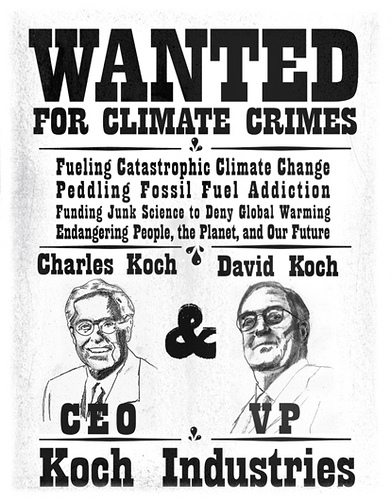The Los Angeles Times reported that Flint Hills Resources, a subsidiary of Kansas-based Koch Industries, donated one million dollars to the campaign for California Proposition 23. Proposition 23 would suspend California’s global-warming law, known as AB 32, until the state’s unemployment rate dropped below 5.5%, a level achieved only three times in the last three decades.
According to the LA Times, California’s global warming law is designed to cut the state’s emission of greenhouse gases to 1990 levels by the end of this decade. A significant chunk of the reductions would come through regulations aimed at fostering alternative fuels and generating electricity from solar, wind and other alternative energy sources.
So it’s no surprise that the Koch brothers, Charles and David, are adamantly against AB 32. Heading one of the largest private companies in the world, the brothers made their billions in oil and happen to be major Tea Party backers.
Governor Schwarzenegger is not too pleased and, in a statement, called the contribution “extremely disappointing.” He described Proposition 23 backers as “a handful of out-of state polluters supporting … the oil companies’ dirty energy proposition.”
It’s cowardly at best to see oil billionaires hide behind the issue of unemployment to further their energy agenda and self interests. Hopefully, Californians will see through the Koch brothers’ disingenuous and hypocritical concern for California’s unemployment rate.
Follow Cindy on Twitter @ethicalbiz
Photo credit: Greenpeace USA 2010 via Flickr







I suppose if you looked it as an isolated incident, yeah, self-interest would be a pretty likely motivator.
Except if you look at it in the context of the Koch’s political philosophy, even if global warming trends are caused by man, and even if those trends are reversible by some change in our behavior, and even if we could do that within our technological and economic means, there’s still a perfectly plausible argument that the expense and degradation in quality of life it might require to reverse those global warming trends is presently not worth it. Compliance costs are real economic costs and they do deprive the economy of real economic value that creates jobs, innovation, research, and wealth.
If you disagree that the potential benefits of a bit of environmental regulation times the likelihood of it doing anything to extend the longevity of the biosphere is not worth the real economic costs of implementing it, fine – make that point. But it’s just a cop out to say “They gain money by this position so we can simply dismiss it ad hominem.”